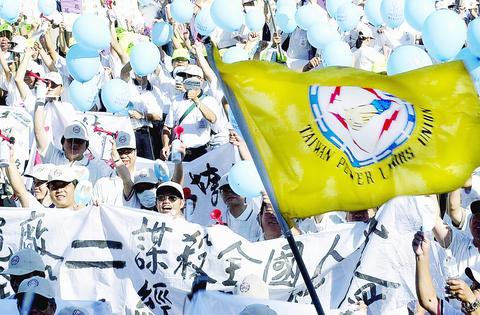President Chen Shui-bian (
In his opening remark at the anti-nuclear convention in Taipei, Chen said the future of the plant would be decided by the people through a referendum, which would be held no later than the March presidential election.
Chen said the two decades of controversy over the plant have taken too great a toll on society.

PHOTO: SEAN CHAO, TAIPEI TIMES
"I believe the public has been fully aware of information about the plant. It's time for people to make a final decision through a referendum," Chen said.
He said the referendum is a right of citizens and would strengthen parliamentary politics.
"This right can't be deprived or limited by any country, political party or person," Chen said.
He stressed that holding a referendum on the plant would fulfill a promise made by the DPP.
"We do so based on concerns about Taiwan's future energy policy and sustainable development rather than for the establishment of a legal basis for related laws mandating referendums," Chen said.
Chen said going nuclear-free reflects both an adjustment of values and a choice of lifestyle.
He said the country should promote energy conservation and the adoption of renewable energy in order to ensure environmental sustainability.
In addition, Chen said problems with the relocation of nuclear waste stored on Orchid Island would be solved by the end of the year.
Chen said the power plant isn't the only policy that can be put to a referendum.
Cabinet Spokesman Lin Chia-lung (
Minister without Portfolio Hsu Chih-hsiung (
Residents of Kungliao, where the controversial plant is being built, said at the conference that a regional referendum held in 1994 in the township suggested that 96 percent of residents are against the plant.
If free access to information on the plant and transparency of the decision-making process remain unavailable, the nationwide referendum would sacrifice Kungliao for economic development, said Wu Wen-tung (吳文通), spokesman for the Kungliao-based Yenliao Anti-Nuclear Self-Help Association.
At the conference, topics included strategies to phase out nuclear energy, the decommissioning of existing nuclear plants, the adoption of renewable energy and the disposal of nuclear waste. The experiences of the US, Japan and Sweden were also presented.
Meanwhile, blasting air horns and waving signs, more than 1,000 employees of state-run Taiwan Power Company demonstrated outside the convention, expressing their opposition to the planned phase-out of nuclear energy.
"The referendum should not be applied to the ongoing project," Taiwan Power Labor Union Director-General Shih Chao-hsien (施朝賢) said.
Shih said that terminating the project would cause at least NT$150 billion in financial losses.
Anti-nuclear activists, meanwhile, said halting construction of the plant was the first step toward making the nation nuclear-free. They urged the government to freeze the budget for the new plant and to enhance security at the three operational nuclear plants.
Also see stories:

ENDEAVOR MANTA: The ship is programmed to automatically return to its designated home port and would self-destruct if seized by another party The Endeavor Manta, Taiwan’s first military-specification uncrewed surface vehicle (USV) tailor-made to operate in the Taiwan Strait in a bid to bolster the nation’s asymmetric combat capabilities made its first appearance at Kaohsiung’s Singda Harbor yesterday. Taking inspiration from Ukraine’s navy, which is using USVs to force Russia’s Black Sea fleet to take shelter within its own ports, CSBC Taiwan (台灣國際造船) established a research and development unit on USVs last year, CSBC chairman Huang Cheng-hung (黃正弘) said. With the exception of the satellite guidance system and the outboard motors — which were purchased from foreign companies that were not affiliated with Chinese-funded

PERMIT REVOKED: The influencer at a news conference said the National Immigration Agency was infringing on human rights and persecuting Chinese spouses Chinese influencer “Yaya in Taiwan” (亞亞在台灣) yesterday evening voluntarily left Taiwan, despite saying yesterday morning that she had “no intention” of leaving after her residence permit was revoked over her comments on Taiwan being “unified” with China by military force. The Ministry of the Interior yesterday had said that it could forcibly deport the influencer at midnight, but was considering taking a more flexible approach and beginning procedures this morning. The influencer, whose given name is Liu Zhenya (劉振亞), departed on a 8:45pm flight from Taipei International Airport (Songshan airport) to Fuzhou, China. Liu held a news conference at the airport at 7pm,

AIR SUPPORT: The Ministry of National Defense thanked the US for the delivery, adding that it was an indicator of the White House’s commitment to the Taiwan Relations Act Deputy Minister of National Defense Po Horng-huei (柏鴻輝) and Representative to the US Alexander Yui on Friday attended a delivery ceremony for the first of Taiwan’s long-awaited 66 F-16C/D Block 70 jets at a Lockheed Martin Corp factory in Greenville, South Carolina. “We are so proud to be the global home of the F-16 and to support Taiwan’s air defense capabilities,” US Representative William Timmons wrote on X, alongside a photograph of Taiwanese and US officials at the event. The F-16C/D Block 70 jets Taiwan ordered have the same capabilities as aircraft that had been upgraded to F-16Vs. The batch of Lockheed Martin

GRIDLOCK: The National Fire Agency’s Special Search and Rescue team is on standby to travel to the countries to help out with the rescue effort A powerful earthquake rocked Myanmar and neighboring Thailand yesterday, killing at least three people in Bangkok and burying dozens when a high-rise building under construction collapsed. Footage shared on social media from Myanmar’s second-largest city showed widespread destruction, raising fears that many were trapped under the rubble or killed. The magnitude 7.7 earthquake, with an epicenter near Mandalay in Myanmar, struck at midday and was followed by a strong magnitude 6.4 aftershock. The extent of death, injury and destruction — especially in Myanmar, which is embroiled in a civil war and where information is tightly controlled at the best of times —